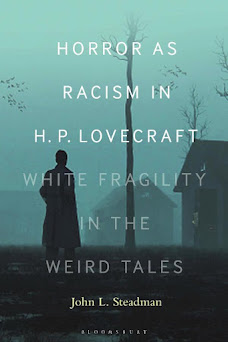Greetings Everyone!
My new book, Horror as Racism in H. P. Lovecraft:
White Fragility in the Weird Tales, has just been released by Bloomsbury,
the foremost academic publisher in the United States and in the United Kingdom!
I hope that all of you will pick up a copy; you can
order it online from the publishers and, of course, from Amazon and other
online booksellers around the world. The
book is also available in bookstores here in the states as well as overseas.
https://www.amazon.com/Horror-Racism-H-Lovecraft-Fragility/dp/B0C5CPHCR2
In my previous posting, I examined Lovecraft’s theory of evolution, where he argues that Anglo-Saxons and the other white races are descended from different, more advanced types of apes than the apes that Blacks are descended from; therefore, Blacks and whites are separate species and Blacks should not be considered as human beings.
In his fictional works, especially in the early
works—the tales that I refer to as the hybrid, degenerative monster
tales—Lovecraft carries this argument even further. He
suggests that when it comes to separate, but similar species such as
Blacks and whites, there is a built-in genetic barrier that excludes members of
the “lower” species from becoming members of the “higher” species. However, the reverse is not true— members of
the higher species can move between the barriers and de-evolve if they so desire, but this
will force them to leave their “humanity” behind.
You can read all about Lovecraft’s theory of evolution
and how he uses it to justify his xenophobic political beliefs in Horror as
Racism in H. P. Lovecraft!
In my next posting, I will examine one of Lovecraft’s
main sources for his views about de-evolution—Robert Louis Stevenson’s famous
novel: Dr. Jekyll and Mr. Hyde.
JLS



